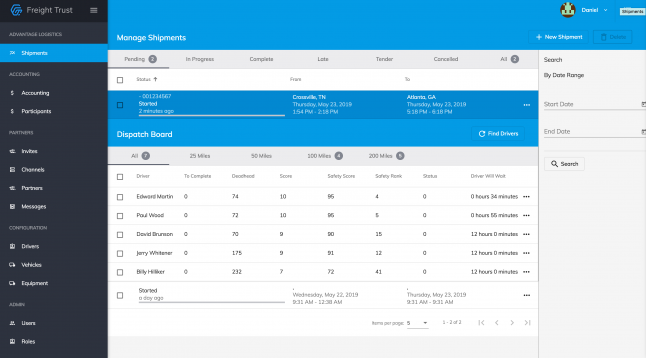

44882
Freight Trust
We network the worlds logistics networks together.
USA, California
Market: Logistics and warehouses, Trade, Transport
Stage of the project: Prototype or product is ready
Date of last change: 12.02.2020
USA, California
Market: Logistics and warehouses, Trade, Transport
Stage of the project: Prototype or product is ready
Date of last change: 12.02.2020
Idea
The Freight Trust Protocol is a new smart contract enabled digital freight management platform that provides a 100% legally compliant paperless workflow that enables frictionless communications and business transactions. From automating detention claims to financing trade shipments and negotiating a faster customs-clearance process, we solve key issues that current legacy systems are unable to fully address. Unlike traditional EDI, our solution negates the need to have paper-based documents and provides EDI and API functionality.
Current Status
We just came into production this week (Feb 12, 2020).
Market
The market size in the united states is at least 8% of GDP, that is LARGER than the Financial Sector of the economy. Our typical customer is an early 50s white male, who has been doing business for 20-30 years. There will be a massive demographic shift in the next decade, and there exists virtually ZERO modern tools for the next generation of business owners in the logistics industry who grew up in a world that always had smartphones.
Problem or Opportunity
The problem exists with legacy EDI systems, lack of visibility and lack of access between business systems in communicating updates for visibility, such as freight tracking, customs clearance, etc. Trucking in the united states is a 700 billion dollar market, and with the rise of e-commerce which saw a 56% growth rate last year (2019) trucking is expected to grow at least 3% per year for the next decade.
Our solution is also providing the only means to have fully autonomous trucks a legal way to pass freight from the carrier to the cosignee.
Our solution is also providing the only means to have fully autonomous trucks a legal way to pass freight from the carrier to the cosignee.
Solution (product or service)
From automating detention claims to financing trade shipments and negotiating a faster customs-clearance process, the Freight Trust Protocol solves key issues that current legacy systems are unable to fully address. Unlike traditional EDI, the Freight Trust Protocol negates the need to have a paper-based document: by achieving both a legal and technical solution to the issues of physicality and electronic uniqueness that is only achievable by the use of blockchain smart contracts, the Freight Trust Protocol enables the logistics networks of tomorrow, today. Our key points of differentiation include a network and clearing participant rulebook (https://github.com/freight-chain/rulebook) along with template master agreements that govern relationships between carrier, shipper, and broker.
Competitors
Emerge TMS, Project44, K Ratio, McLeod, Trimble, Convoy
Advantages or differentiators
We have patents we want to apply for that are unique to our blockchain mechanisms for interacting with existing EDI solutions, alot of potential IP that will help grow barriers to entry. Also we have the only automated detention claims processing system that does not involve booking loads with us such as Convoy. Unlike our competitors, we also provide invoice factoring through a 3rd party and have white label solution sets.
Finance
We sell our product on a per transaction base, with a per user (seat) pricing. For example, we sell at $1 per transaction, plus a fee of $100 per month with a $500-$1500 setup fee.
Business model
Our business model is a SaaS based pricing scheme, however we have been considering doing a gradient price scheme where businesses with less than 5 trucks can use the platform on a strictly transaction basis. I think the business model is the most important aspect to user adoption in our industry, it has very structured pricing models.
Money will be spent on
Patents, hiring 2 developers full time and hiring 1 salesperson/marking person and a part-time (off hours) customer service representative.
Offer for investor
Equity
Team or Management
Invention/Patent
Can provide patents we are in the process of filing for unique blockchain, and reed solomon solution sets for generating secured QR codes.
Sign in/Sign up